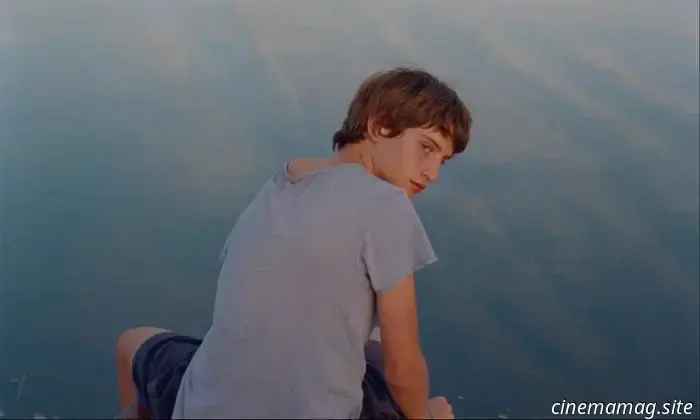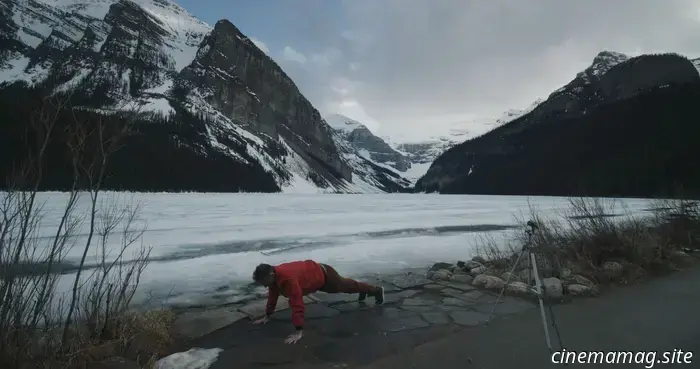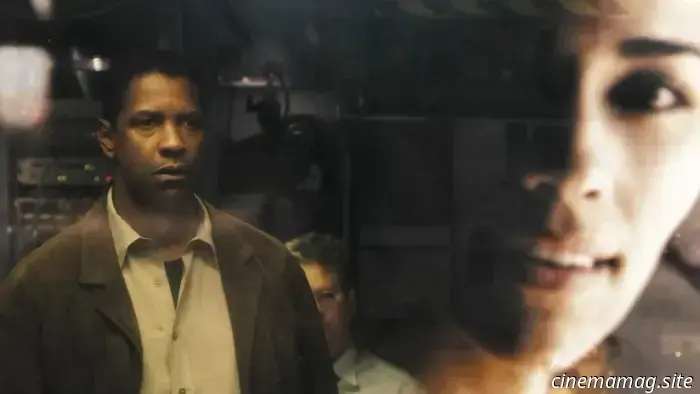
Venice Review: Strange River Highlights Jaume Claret Muxart as a Significant Talent
Traveling in an unfamiliar country can be bewildering. Established habits lose their significance. New sights, sounds, and scents can evoke past memories or awaken fresh desires. Making its debut in the Orizzonti sidebar at the 82nd Venice Film Festival, Catalan director Jaume Claret Muxart’s first feature film, Strange River, takes audiences on a journey with a Spanish family through southern Germany. What begins as a light, authentic depiction of life gradually becomes disconnected from reality and drifts into a more dreamlike state. Occasionally reminiscent of Angela Schanelec’s poetic minimalism or Apichatpong Weerasethakul’s queer-tinged surrealism, Muxart’s seemingly straightforward film may require several viewings to unravel the layers beneath its stunning, laid-back exterior.
The film lacks a substantial plot. We follow 16-year-old Didac (Jan Monter), along with his parents and two younger brothers, as they cycle along the Danube in Germany. They engage in playful bickering, take swims, set up camp, and continue their journey. At night, Didac rehearses lines from a play with his mother, roughhouses with his brothers, or gazes blankly into the distance, lost in his own thoughts. The limited insights we gain about this family come through casual exchanges; for instance, both parents are aware that Didac is gay and has a crush on a village boy who is giving mixed signals. Additionally, Didac's mother reveals that she cycled the same route in her youth, where she encountered her first love. This character development is not explicitly tied to significant plot moments but instead lingers within the sparse narrative as the journey unfolds. A notable event occurs when another teenage boy appears, initially seen swimming next to Didac in the river—ethereal and entirely naked like a merman. This ghostly figure continues to appear wherever Didac goes, igniting a wordless romance that may exist solely in the protagonist’s imagination.
Viewers looking for complete story arcs and clear resolutions may find Strange River challenging. Muxart intentionally minimizes elements that could add structure and depth to his script; he crafts the film to intentionally resist straightforward coherence. Just as one expects a scene to develop, it abruptly shifts to something entirely different. A day’s journey might be condensed into a one-minute montage nestled between extended close-ups of sun-kissed bodies or longing gazes. The connection between cause and effect is disregarded; soon enough, the audience realizes they are unsure of how long the characters have been traveling or their current location. The intuitive (if not downright enigmatic) editing creates a sense of routine repetition that could frustrate many viewers. Nevertheless, those who yield to the film’s hypnotic rhythm may come to appreciate the exhilaration of abandoning logic and venturing into the unknown.
The second half of Strange River, in particular, features many wonderfully surreal moments that defy explanation. Didac is seen wandering what seems to be a cruising ground for gay men, where young individuals share charged, meaningful glances. At the end of his stroll, he observes a woman passionately kissing one of these young men, calls out "mother" to the shadowy figure, and then hurriedly departs. It remains unclear how Didac arrived at this location or if the woman is indeed his mother—and if so, whom she is kissing and why. In the following scene, the family has moved on without addressing the incident. Are we to interpret it as merely a dream? Or did this peculiar journey grant a mother of three an opportunity to revisit her past and confront some regrets? As the film progresses, the disparity between what is believable and what occurs grows increasingly pronounced. There are moments when a character finds themselves isolated, and in Didac's case, accompanied by the enigmatic, silent boy. Recognizing that what is witnessed cannot be literally happening allows viewers to indulge in the gentle, boundless in-between, creating a sense that, for a time, everything might turn out fine.
Strange River is beautifully shot by Pablo Paloma and accompanied by a haunting score from Nika Son, offering a warm, nostalgic quality reminiscent of memories. Its earthy color palette, natural lighting, and strong visual emphasis on the human form give it an ageless quality. Although Muxart may still need to establish his prowess in narrative storytelling, this mysterious, captivating debut undoubtedly introduces us to a filmmaker who comprehends and has the language to articulate the complexities of the human experience.
Strange River premiered at the 2025 Venice Film Festival.
Other articles
 The initial teaser for Jim Jarmusch's Father Mother Sister Brother has been released in anticipation of its Christmas debut.
After six years since The Dead Don't Die (enough time for that film to have become underrated), Jim Jarmusch is back with Father Mother Sister Brother. This new work marks his return to the episodic format reminiscent of Night on Earth and Coffee and Cigarettes, exploring three family narratives featuring Cate Blanchett, Vicky Krieps, Adam Driver, Tom Waits, and Mayim.
The initial teaser for Jim Jarmusch's Father Mother Sister Brother has been released in anticipation of its Christmas debut.
After six years since The Dead Don't Die (enough time for that film to have become underrated), Jim Jarmusch is back with Father Mother Sister Brother. This new work marks his return to the episodic format reminiscent of Night on Earth and Coffee and Cigarettes, exploring three family narratives featuring Cate Blanchett, Vicky Krieps, Adam Driver, Tom Waits, and Mayim.
 Experience America’s Cultural Decline in the Exclusive Trailer for End of History.
We are excited to highlight a genuine indie film today. Created on a modest budget of approximately $5,000 during a 10-day journey to Deadhorse, Alaska, Jacob Gregor's End of History offers a satire on the grim condition of American culture, or what remains of it. It will have its world premiere at the Chicago Underground Film Festival this September.
Experience America’s Cultural Decline in the Exclusive Trailer for End of History.
We are excited to highlight a genuine indie film today. Created on a modest budget of approximately $5,000 during a 10-day journey to Deadhorse, Alaska, Jacob Gregor's End of History offers a satire on the grim condition of American culture, or what remains of it. It will have its world premiere at the Chicago Underground Film Festival this September.
 NYC Weekend Highlights: New Orleans, Shinji Sōmai, Charlie Chaplin, and More
NYC Weekend Watch is our weekly summary of repertory events. Museum of Modern Art features a series about New Orleans before, during, and after Hurricane Katrina, which includes a 35mm screening of Déjà Vu, while the Michael Caine retrospective is ongoing. Film at Lincoln Center is showcasing double features of M. Night Shyamalan films paired with personally selected companions, along with a newly restored version of Shinji Sōmai’s The Friends (check out our
NYC Weekend Highlights: New Orleans, Shinji Sōmai, Charlie Chaplin, and More
NYC Weekend Watch is our weekly summary of repertory events. Museum of Modern Art features a series about New Orleans before, during, and after Hurricane Katrina, which includes a 35mm screening of Déjà Vu, while the Michael Caine retrospective is ongoing. Film at Lincoln Center is showcasing double features of M. Night Shyamalan films paired with personally selected companions, along with a newly restored version of Shinji Sōmai’s The Friends (check out our
 The Korean animated action horror film Exorcism Chronicles: The Beginning has released a trailer, poster, and images.
Viva Pictures has unveiled the trailer, poster, and images for Exorcism Chronicles: The Beginning, an animated supernatural action horror film directed by Kim Dong-Chul. Based on the popular Korean serial novel Toemarok, the movie follows a monk and an excommunicated priest as they join forces to safeguard a powerful boy from sinister entities. Take a look at […]
The Korean animated action horror film Exorcism Chronicles: The Beginning has released a trailer, poster, and images.
Viva Pictures has unveiled the trailer, poster, and images for Exorcism Chronicles: The Beginning, an animated supernatural action horror film directed by Kim Dong-Chul. Based on the popular Korean serial novel Toemarok, the movie follows a monk and an excommunicated priest as they join forces to safeguard a powerful boy from sinister entities. Take a look at […]
Venice Review: Strange River Highlights Jaume Claret Muxart as a Significant Talent
Journeying in an unfamiliar country can be bewildering. Familiar routines become irrelevant. New sights, sounds, and smells may evoke past memories or spark fresh ambitions. Making its debut in the Orizzonti section of the 82nd Venice Film Festival, Catalan director Jaume Claret Muxart's first feature, Strange River, invites you on a road trip with a Spanish family through
